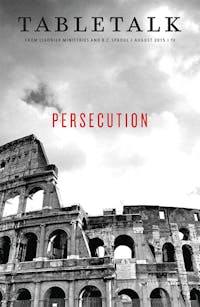
Request your free, three-month trial to Tabletalk magazine. You’ll receive the print issue monthly and gain immediate digital access to decades of archives. This trial is risk-free. No credit card required.
Try Tabletalk NowAlready receive Tabletalk magazine every month?
Verify your email address to gain unlimited access.
The signers of the American Declaration of Independence were just a few generations removed from the first European settlers, many of whom came to the New World to escape religious persecution. A commitment to freedom of religion was therefore woven into the fabric of American culture and supposedly guaranteed in perpetuity by the Constitution. From our country’s founding until today, Christians in America have faced relatively little persecution.
By the end of World War II, however, American attitudes toward religion had begun to shift. Courts, educational institutions, the entertainment industry, and legislative bodies all seemed to adopt a bias against religion. By the 1960s, small but vocal groups of militant atheists had begun to argue that what the Constitution really warrants is freedom from religion rather than freedom of religion.
We now live in a secular culture, governed by secularists, driven by worldviews that are hostile to biblical principles. Expressions of religious faith are often banned from public discourse—sometimes by societal pressure, sometimes by legal injunctions.
Still, the persecution we face in Western democracies is far milder than what many believers have endured throughout church history. Multitudes have paid for their faith with their lives. Even now in countries under Islamic rule, Christians are being put to death for what they believe. It’s not inconceivable, however, that brutal forms of physical persecution and stricter forms of legal harassment will soon threaten Christians in the West. What are Christians to do?
Many evangelicals seem to think political activism is the best answer. For decades, Western evangelicals have been responding to cultural shifts and legislative setbacks with boycotts, demonstrations, public protests, get-out-the-vote campaigns, and angry rhetoric. That strategy so far has not kept our culture’s spiritual decline from steadily accelerating. More important, such tactics have done little to advance the gospel.
No wonder. There is no biblical mandate for that approach and no such example from the leadership of Christ or the Apostles. Scripture calls for a different kind of response: “Bless those who persecute you” (Rom. 12:14). Notice the imperative. That is not a command to be passive and nonresistant. Quite the contrary, it calls for an active response. We are to bless our persecutors.
That certainly seems counterintuitive. The carnal mind will instantly suggest reasons why it’s a bad idea. But Scripture is consistent. Jesus said, “Love your enemies, do good to those who hate you, bless those who curse you, pray for those who abuse you” (Luke 6:27–28).
Again, the verbs are active and transitive. What Jesus calls for is not merely a feeling or an attitude. He has something more in mind than a verbal benediction. He is instructing us to respond to persecution with acts of lovingkindness toward those who oppress us (vv. 29–30).
Our Lord goes on to say, in essence, that to “bless” those who persecute us is to treat them as friends—or more specifically, as we ourselves would wish to be treated (vv. 31–38).
These were not mere words. In His dying moments, Christ interceded on behalf of those who crucified Him: “Father, forgive them, for they know not what they do” (Luke 23:34). Stephen, the first Christian martyr, responded in precisely the same way in behalf of those who stoned him (Acts 7:60).
Ultimately, there is no better way to bless those who persecute us than by showing them the truth of the gospel. As a matter of fact, that is the only appropriate way to respond when suffering for Christ’s sake (1 Peter 2:21–23).
Everything proud and fleshly in us screams against such a strategy. But here’s a reminder: it is a token of divine blessing and a cause for rejoicing when God counts us worthy to suffer for Christ’s sake (Acts 5:41). To suffer on His account, Christ taught, is the very pinnacle of blessing (Matt. 5:10–11). Moreover, Scripture says it is inevitable that believers who truly seek to be faithful will suffer at the hands of those who hate Christ (John 15:18–20).
Some Western Christians, accustomed to a comfortable faith without much threat of persecution, imagine that if the world hates Christians and their message, it can only be our own fault. We must adjust the message, they think. Perhaps we can tone down the offense of the gospel, or make ourselves more winsome by adopting the badges of worldly culture. Be seeker-sensitive, they say.
That, unfortunately, is the course many American evangelical leaders have championed for the past half-century. But frankly, seeker-sensitive religion has been a monumental spiritual failure. The quest for worldly esteem leads to spiritual disaster (James 4:4). That itch for the world’s favor causes people to go to shameful extremes in order to avoid saying or doing anything that might cost them esteem in the eyes of unbelievers—even denying what they know to be true. However, Christ’s charge to us as believers is not to avoid the world’s contempt, but to respond rightly to it, as He Himself gave us the perfect example.
But what if the world’s hatred does reach the point where our very lives are threatened?
Truly following Christ means being willing to die for Him. That principle, after all, is built right into His call to discipleship (Matt. 16:24–26).
